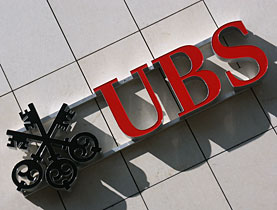US tax evasion probe “threatens Swiss banking”

Swiss banking giant UBS is coming under increasing pressure as details of alleged complicity in a tax evasion scam came to light in a United Sates court this week.
The prosecution of Bradley Birkenfeld, a former private banker for UBS, along with other investigations by US tax authorities threatens to undermine the foundations of the Swiss banking system, according to an asset management specialist.
“This is a direct and coordinated attack on the heart of the Swiss financial system. This is a long-term threat that will not go away, and there is not too much Switzerland can do,” Teodoro Cocca, formerly with Zurich University’s Swiss Banking Institute, told swissinfo.
Birkenfeld on Thursday admitted to helping an American billionaire to illegally evade millions of dollars in taxes. A Florida court heard how he helped his client set up shell companies and trusts as well and spirit jewellery to Swiss accounts.
He told the judge that he had been “incentivised” by UBS to carry out these underhand activities and accused the bank of advising other employees on how to hoodwink the US tax authorities. He said he would continue to cooperate with prosecutors.
The ongoing case, as well as separate demands from the US Department of Justice for UBS to hand over the names of other wealthy clients, has prompted the involvement of the Swiss government.
A delegation from the justice and finance ministries met with US officials on Friday in Washington, but the exact itinerary of their talks was not revealed.
“UBS intends to appropriately and responsibly address and correct any issues raised in the investigations,” the bank said in a statement. But it would not comment on details of the court case.
Concerted attack
The US investigations are part of a coordinated attack on controversial Swiss banking practices, said Cocca, now a professor at the Johannes Kepler Institute in Linz, Austria.
The professor linked the US probe with a recent German tax evasion investigation that centred on Liechtenstein. He believes that the US and European Union countries have launched an unstoppable attack on tax havens.
The big sticking point between the two sides is Switzerland’s refusal to criminalise tax evasion. This allows institutions to hide behind banking secrecy laws unless investigators in other countries can prove fraud has been committed.
“Ten years ago, it was accepted that there were a few offshore centres acting as safe havens for tax evaders. But the world has changed and in today’s global village it is dangerous to stand out with different laws,” Cocca said.
In 2001, UBS agreed to provide details of US clients to the tax authorities, while in 2005 Switzerland negotiated a withholding tax treaty with the EU. This compelled Swiss banks to collect tax on savings account interest earned by EU resident customers unless they voluntarily disclosed details to their home country.
Offshore demise
But Cocca believes that these small compromises would never be enough to satisfy Switzerland’s critics, particularly when banks manage to find loopholes to exploit.
“Sooner or later Switzerland’s strange legal distinction between tax evasion and tax fraud will have to disappear or be amended.”
If that happens, banks will have to radically change their strategies as offshore banking clients go elsewhere to do business, Cocca added.
“The larger banks, such as UBS and Credit Suisse, have already recognised that they are on dangerous ground and have started to move more of their operations onshore. But the smaller private banks have more of a problem because they cannot afford to invest in more onshore activities,” he said.
swissinfo, Matthew Allen in Zurich
Birkenfeld, Liechtenstein national Mario Staggl and other “known and unknown” individuals were indicted in May.
Birkenfeld was accused of assisting real estate developer Igor Olenicoff evade $7.2 million (SFr7.53 million) in taxes.
Prosecutors allege that Birkenfeld, a US citizen based in Switzerland, smuggled diamonds into the US in a toothpaste tube.
He told prosecutors he acted to avoid risking the loss of $20 billion of assets, which generated around $200 million annually for UBS.
Staggl remains at large, Olenicoff has pleaded guilty to filing a false tax return and Birkenfeld is scheduled to be sentenced on August 13.
People wishing to dodge paying taxes on their assets can do so by three means: avoidance, evasion and fraud.
Avoidance is the legitimate means of structuring finances so they don’t fall under the scope of taxable assets. This can be done, for example, by setting up a trust fund or by changing country residence or nationality.
Evasion is the deliberate concealing the true state of assets from the tax authorities – in other words, lying about the extent of your assets.
This is a civil offence in Switzerland and some other countries, such as Austria and Liechtenstein, but criminal in most states.
The main distinction between evasion and fraud is that the perpetrator tells lies on official documentation. This is sometimes known as “aggravated” tax evasion.
Unless tax fraud can be proved, Swiss banks are not obliged to hand over details of accounts and client assets to investigators.
In some cases this information is needed before fraud can be established in the first place.

In compliance with the JTI standards
More: SWI swissinfo.ch certified by the Journalism Trust Initiative











You can find an overview of ongoing debates with our journalists here . Please join us!
If you want to start a conversation about a topic raised in this article or want to report factual errors, email us at english@swissinfo.ch.